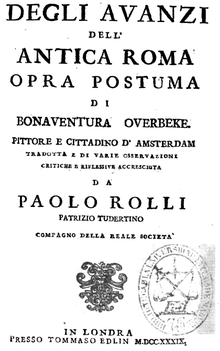Paolo Rolli

Paolo Antonio Rolli (13 June 1687 – 20 March 1765) was an Italian librettist and poet.[1]
He was born in Rome, Italy and like Metastasio was trained by Gian Vincenzo Gravina. He was Italian tutor to Caroline of Ansbach and then undertook the same role in London from 1715 to 1744 for her children Frederick, Amelia and Caroline[2]. During this period, he wrote librettos for numerous Italian operas including Handel's Floridante (1721), Muzio Scevola (1722), Riccardo Primo (1927) and Deidamia (1741) and Nicola Porpora's La festa d'Imeneo (1736) and Orfeo (1736)[3]. He also worked frequently with composer Giovanni Bononcini writing and adapting numerous librettos for him including his popular Griselda (1722). In December 1729 he was elected a Fellow of the Royal Society.[4]
In 1744 he returned to Italy and wrote poetry, cantata texts, satires and translations and also published an Italian verse translation of Milton's "Paradise Lost". He died in Todi, Italy.[1]
References
- 1 2 Paolo Rolli at Encyclopædia Britannica
- ↑ George E. Dorris, Paolo Rolli and the Italian Circle in London, 1715–1744 (Walter de Gruyter GmbH & Co KG, 1967), page 145
- ↑ R. A. Streatfeild, 'Handel, Rolli, and Italian Opera in London in the Eighteenth Century', The Musical Quarterly, Vol. 3, No. 3 (Jul., 1917), pp. 428-445
- ↑ "Library Collection – Fellow details". The Royal Society. Retrieved 8 October 2010.